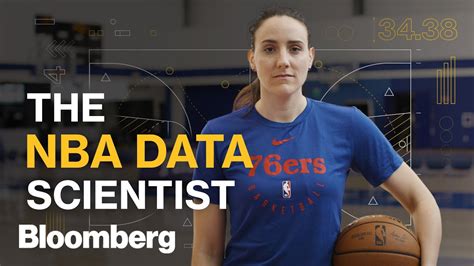Introduction

The National Basketball Association (NBA) is a highly competitive and data-driven league. As the use of analytics continues to soar in the sports industry, the demand for NBA data analysts is on the rise. These professionals play a vital role in helping teams make informed decisions on player performance, team strategy, and overall organizational success.
What Does an NBA Data Analyst Do?
NBA data analysts leverage their expertise in data science, statistics, and basketball knowledge to perform various tasks, including:
- Collecting and analyzing data: Gathering data from various sources, such as game footage, player tracking, and team statistics.
- Identifying trends and patterns: Identifying key insights and trends in the data that can inform decision-making.
- Developing models and visualizations: Creating statistical models and visualizations to help teams understand and interpret data.
- Preparing reports and presentations: Communicating findings and recommendations to coaches, players, and management.
Skills and Qualifications
To succeed as an NBA data analyst, you typically need the following skills and qualifications:
- Strong understanding of data science and statistical concepts: Proficiency in statistical analysis, data mining, and machine learning.
- Basketball expertise: Extensive knowledge of the game, team dynamics, and player performance metrics.
- Excellent communication and presentation skills: Ability to effectively convey complex data and insights to various stakeholders.
- Bachelor’s or Master’s degree: Typically in data science, statistics, computer science, or a related field.
Career Outlook
The job outlook for NBA data analysts is highly promising. According to Indeed, the average salary for a data analyst in the NBA is over $100,000 annually. As the league continues to invest in analytics, the demand for skilled professionals is expected to grow significantly in the coming years.
Benefits of NBA Data Analytics
Leveraging data analytics in the NBA offers numerous benefits to teams and the league as a whole:
- Improved player evaluation: Data analysis helps teams identify and develop high-potential players based on objective metrics.
- Enhanced team strategy: Insights gained from data can inform decision-making on player rotations, offensive plays, and defensive schemes.
- Informed injury prevention: Data analysts can identify players at risk of injury and develop strategies to mitigate risks.
- Personalized player development: Teams can use data to tailor training and nutrition plans to the specific needs of each player.
- Increased fan engagement: Data-driven storytelling can enhance fan engagement by providing insights into the game and player performance.
Innovative Applications of NBA Data Analytics
Beyond the traditional applications described above, NBA data analytics can be used to explore innovative and creative new areas, such as:
- Personalized fan experiences: Data can be used to create customized content and experiences for fans based on their preferences and viewing habits.
- Injury risk prediction: By analyzing historical data, data analysts can develop models to predict the likelihood of injuries for individual players.
- Simulation of game scenarios: Data can be used to simulate game scenarios and evaluate the potential outcomes of different strategies.
- Blockchain-based sports betting: Data analytics can help inform and enhance the experience of blockchain-based sports betting platforms.
Common Mistakes to Avoid
To avoid common pitfalls in NBA data analytics, consider the following:
- Relying solely on historical data: While historical data is valuable, it’s important to consider current trends and evolving strategies.
- Overreliance on complex models: Keep models simple and interpretable to ensure they provide actionable insights.
- Ignoring player and organizational context: Data analysis should not occur in isolation but should be contextualized within the team’s culture and goals.
- Lack of communication and collaboration: Foster open communication and collaboration between data analysts, coaches, and players to ensure data is used effectively.
Tips and Tricks
To excel in NBA data analytics, consider the following tips and tricks:
- Use multiple data sources: Leverage a variety of data sources, such as game footage, player tracking, and social media data, to gain a comprehensive view.
- Visualize your data: Create compelling visualizations to communicate insights effectively to stakeholders.
- Collaborate with domain experts: Consult with basketball coaches, players, and trainers to gain practical insights and validate findings.
- Stay up-to-date with the latest trends: Attend conferences, read industry publications, and engage in online forums to stay informed about emerging technologies and best practices.
Questions to Engage Customers
To validate your customers’ point of view and ensure alignment, ask thought-provoking questions such as:
- What specific challenges are you facing in your organization that data analytics could potentially address?
- How do you envision using data analytics to improve player performance and team strategy?
- What are the key success metrics that you would use to evaluate the effectiveness of a data analytics initiative?
Data Analyst Job Boards
To enhance your job search, consider registering on dedicated data analyst job boards:
Table 1: Data Analyst Job Boards
| Job Board | Link |
|—|—|—|
| LinkedIn | https://www.linkedin.com/jobs |
| Glassdoor | https://www.glassdoor.com/Job-Listing.htm |
| Indeed | https://www.indeed.com/jobs |
| Springboard | https://springboard.com/job-board |
| Dice | https://www.dice.com/jobs |
Table 2: NBA Data Analyst Salaries
| Experience | Salary |
|---|---|
| Entry-level | $80,000-$100,000 |
| Mid-level | $100,000-$150,000 |
| Senior-level | $150,000+ |
Table 3: NBA Data Analyst Skills
| Skill | Importance |
|---|---|
| Data analysis | Essential |
| Statistics | Essential |
| Basketball knowledge | Essential |
| Communication | Important |
| Presentation | Important |
Table 4: NBA Data Analyst Education
| Degree | Importance |
|---|---|
| Bachelor’s degree | Required |
| Master’s degree | Preferred |
| Doctorate | Not required |
Conclusion
NBA data analyst jobs offer a thrilling and rewarding career path for individuals passionate about basketball and data science. By leveraging their expertise, these professionals play a pivotal role in driving team success and shaping the future of the NBA. As the league continues to embrace data analytics, the demand for skilled data analysts is expected to soar, providing ample opportunities for growth and impact within the world of professional basketball.
